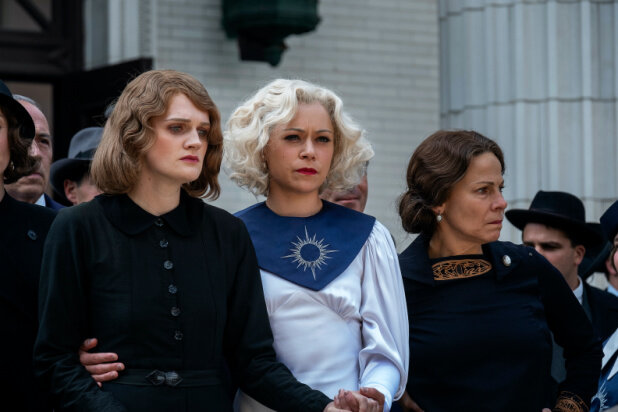The Karens Dimension of Perry Mason
The women of Perry Mason. Image courtesy of HBO.
I’ve been hearing a lot about ‘Karens” in the news. One recent, infamous manifestation is Amy Cooper, the Central Park dog walker who called the police on a Black bird-watcher (who turned out to actually be the head of the local Audobon society) for asking her to put her illegally off-leash dog on-leash.
The latest episode of Code Switch, titled “What’s in a ‘Karen,’” delves into the deeper history of power dynamics between white women and people of color. I encourage you to check out the full episode, which is a true delight. The main takeaway, though, is that when white women feel that their societal standing is somehow threatened (in the case of Amy Cooper, when a Black man asks them, rightfully, to leash their dog and they don’t want to), they sometimes react by trying to enforce their will themselves. If they don’t have the authority to bring the change they want (like when Chris Cooper wouldn’t back down), “Karens” call upon the institutions that historically have protected white women (such as white men… and/ or police officers).
Since that episode, I’ve been thinking a lot about my own experiences with police officers. I remembered the mid-pandemic incident when I was pulled over for speeding and the officer requested me to sit in his [enclosed] car with him [not wearing a mask] while he wrote me a speeding ticket because, “it’s just quicker to get it signed that way.” I wondered how that may have played out differently if I wasn’t a white woman. I considered the entire premise of To Kill a Mockingbird’s plot line.
The ways in which women gain and maintain power has been top of mind for me, so I couldn’t help but notice how power dynamics of white women and white male institutions manifest in HBO’s remix of Perry Mason. In 1930s Los Angeles, a defense lawyer hires Perry Mason (Matthew Rhys) to gather the evidence needed to exonerate his clients, the parents of a murdered child. While the women in this show aren’t using their standing to reinforce their social position over people of color, we do witness many female characters who have power through their proximity to white men.
In the series, Perry expends an impressive amount of energy butting heads with his employer’s assistant, Della (Juliet Rylance). She often acts as a voice of reason and ethical compass for the men running roughshod through the case. She’s the only character looking out for the well-being of the grieving parents, and her insights are frequently -- and frustratingly -- disregarded. Della’s status as a female assistant makes her easy for male characters to dismiss, but she does have a modicum of power in that her employer, a somewhat-powerful white man, clearly depends on her to keep the company running.
Sister Alice (Tatiana Maslany) is a rare female preacher who happens to lead the congregation that the grieving parents attend. She arguably enjoys more power and fame than any of the other female characters. Her standing, however, is propped up by the interests of white businessmen who see her as a conduit to a guaranteed place in heaven and the good graces of the God they worship. Her status is driven by her proximity to power and the interests of men who wield it.
Thus far, the show only has one main character who is Black: a talented young police officer named Paul Drake who has all the makings of a first-rate detective. He and his wife show us a glimpse of the biases and prejudices present in post-WWI L.A. His career is limited to his beat patrol by the LAPD’s racist policies: as one white detective puts it, “there are no colored detectives.”
We do encounter one woman who has power of her own. Lupe Gibbs (Veronica Falcón) is a Latina pilot trying to purchase Perry Mason’s run-down family dairy farm to construct a second runway for her airport. She defies Karen-ness through the innate fact that she’s simply not white, but also through her fierce independence. She physically rejects the standard confines of womanhood and standard female roles. We see her flying her biplane at a time when there were precious few female pilots, and we never see her confined to the domestic space of a kitchen or relegated to a homemaking role. If Perry sulks, Lupe disappears, rejecting the standard role of a female caretaker.
As we all continue to fight toward a more just and inclusive society, we need to keep finding ways to question those entrenched power dynamics. Take a break to enjoy a show, or check out our latest episode, The Beautiful Complexity of Feminism, in case you missed it.
Be kind to yourself, and each other, and stay safe out there.
